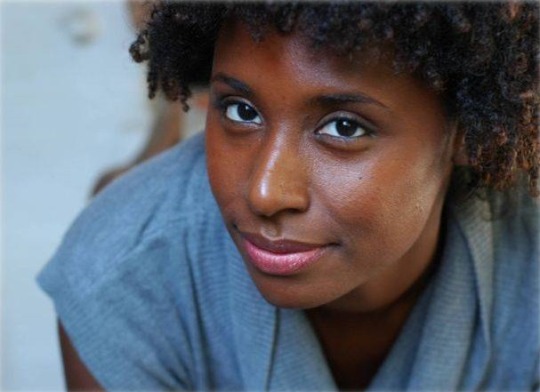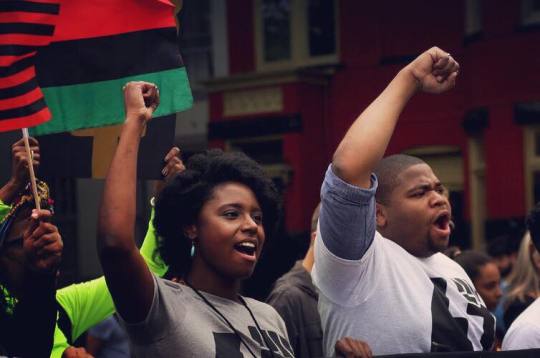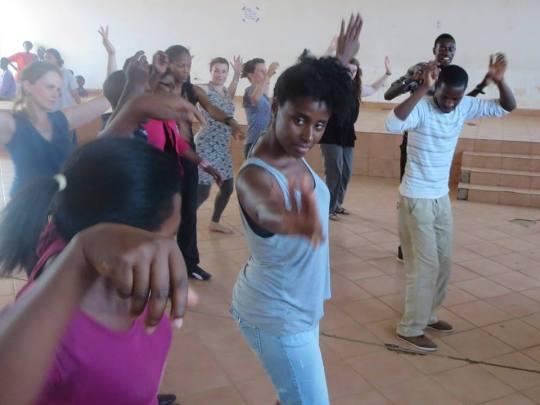#projectrwanda
Explore tagged Tumblr posts
Text
Dorcas Davis (’14): staying nourished for the long journey

Dorcas Davis (’14) is Co-Founder and National Co-Chair at the March for Racial Justice and National Director of Strategic Projects at The Posse Foundation.
Michael Wilson (’11) grabbed dinner with Dorcas to talk about what drives her, what sustains her, and how she became the leader she is today.
You were just saying this work is your saving grace.
Yeah. I say that because right after the election—literally the day after—I had a workshop to do, with some staff at one of the CUNY libraries. I walked into that space and everybody was shell-shocked. And it took me out of my “oh my God what is happening right now?” Because I had to show up and be present. And it was the best thing I could have done after Trump was elected. Because it was like, okay, it’s not about this moment. Everybody in this room, and myself included, is going to be continuing on. So what do we do? What do I want this journey to look like? How would I craft a journey that other people can join me in on, right? And that just comes up, period, in everything I do. Because it’s not just for myself that I’m doing it.
Where’s the journey headed?
Dorcas: Oh my god, I don’t know! Laughs. I’m hoping that it’s headed toward a place of peace. A place of greater connection, greater love. I know from my journey to this point…it’s been more meandering than linear, you know what I’m saying? And I’m enjoying that: the growth that comes with that. The fear and freedom that comes with not knowing. But also being intentional about the kind of work that I want to do and the kind of life I want to live. And that’s been the constant. So, no matter what task or job that I have, I know it will be serving the type of work that I want to do and the type of life that I want to live.
What’s a story that connects to that kind of intentionality?
A story. Hmm. Last year was the year I did the March for Racial Justice. My skills as a facilitator were needed more than I thought. [faculty member] Helen White does this wonderful exercise in our first year, where she asks us to be clear, or write down what our values are as a facilitator. “What are YOUR values?” I remember doing that exercise. Because I needed to be clear about how I walked into a room, how I show up, what is my intention to create there.
The first night I met a couple of people. I was greeted with a lot of suspicion. And I had to say to myself, in the moment, what reason would they have to trust you? You’re making real assumptions about who you are to these people. So what your goal is, here, is not to recruit them in anything, but to make them feel comfortable with you. That’s it. One lady was looking me up on Facebook while she was talking to me. Laughs. She was like, um, yeah, I’m looking—I was like, yeah, look-up whatever you need to look-up, I will help you. I want you to know who I am and how I’m coming.
One of your values is honoring people.
Honoring people with love. I want anybody who I encounter to feel loved. I want people to feel honored, I want people to feel respected.
So I told some jokes, we had conversation, and that was it. And we had talked about meeting the next day, because Philando Castile ’s mother was going to join us the next day. Through them. And we had planned to talk about the march the next day. After I left them that night, I had no idea how many were going to show up. Because it wasn’t like, “warm welcome,” none of that happened.
And so the next day, everybody was there plus more. With Valerie Castile.
I got shivers up my spine.
The commonality between us all was we had a loved one who was killed or beaten or assaulted in some way by police officers. And it was like, this is the thing that unites our American experience. And this can’t be. This is horrible. And so, after everyone said their goodbyes, and committed to coming to the march, I was like, wow. Okay. I knew it wasn’t just me at work there. Because I said a prayer before I—I said, “God, give me the words I need to say.” I’ve never been in this situation before. So I can’t depend on some prior knowledge.
And so that’s very similar to what happens when I’m in the room [facilitating]. It’s like, I do have activities, and different processing questions, yes, I have all this stuff, but what I have most of all is presence, and being present with the people in that room. So if I see you’re all tensed up, I’m gonna deal with that. I’m gonna deal with the human being, before I get to, “we need to have dialogue.”

Dorcas in the March for Racial Justice--September 30, 2017. Photo: Coby Owens.
That’s so true about you, Dorcas. That you go for working and responding with what’s really in front of you.
Thank you for that mirror. Because that is a value for me. It’s important for me to see people and have them know that I see them. That has served me. And I think it’s what continues to draw me to do this work. Because I’m usually in a room with people who are feeling conflicted—there’s an issue, and that’s why I’m in the room.
I want to ground the conversation, for our readers. What is the organization you’re working with, and what do you do?
Currently, I am the National Director of Strategic Projects for the Posse Foundation. I do diversity and inclusion workshops and design diversity and inclusion programming for colleges and universities, nonprofit organizations, for-profit enterprises and businesses. Some very big corporations. Some small ones. Even school districts have come to us and said, “we need this.” So what I’m doing is: “well, okay, what is the issue that you have, around diversity and inclusion. What do you want to do?” Because I work with people who have a commitment to diversity and inclusion. I’m not trying to change somebody’s mind and convince them that this is necessary.
There’s an assumption that’s made that people know what the next step is. But we don’t have a history to fall back on of diversity and inclusion in the United States. So, since that’s something that’s not necessarily part of our culture, how can we teach people?
The master’s tools can’t dismantle the master’s house.
Exactly. Exactly. The vision for the United States wasn’t “diversity and inclusion,” no matter what’s written in that constitution. Right? So we have to envision something else. And a lot of my work is helping people envision it. What’s this gonna look like? On a micro level in their organization. And the more people we have invested in the vision of diversity, then the more powerful the macro vision can be. Because people earnestly want to know how—they want to know, “how do we do this? I heard it’s good.”
That makes me feel hopeful…we were talking about this beforehand. You were talking about doing work for the future. Can you give me that again?
We have an obligation to our visions. And the visions that we have are not for ourselves. They’re visions for our children and our grandchildren, and whoever’s coming after us. Just like we live in the vision of our ancestors. Somebody thought about me sitting across from you, freely, before this ever happened. Right? They didn’t live it—I’m living it. Because they thought about me. So, anyone who is interested in doing work around diversity and inclusion and racial justice and social justice, yes, there are immediate concerns, but there’s also the long game.
What would you say to someone who’s thinking about training in applied theatre?
First, I would ask them, what brings them to it? Because I think about my own journey. I was a full-time artist. It was something that wasn’t quite enough for me. I was a teacher too, so I was like, I love that service aspect. I love working with people. And so, when I found applied theatre, I was like, oh my god, it’s everything in one for me. Because I needed to express my artistry and creativity, but I also needed to be of service, in a very tangible, immediate kind of way. And I needed to be in conversation.
I got all of that in applied theatre…and also the lens of a facilitator, which is very different from the lens of a teacher that I’d had.
How are those lenses different?
The job of the facilitator is to make things easier. Make the conversation easier, make the confusion or whatever is happening easier to digest. That switch happened for me in Rwanda. Because I was “teaching the class,” air quotes... And I noticed that three or four people were consistently talking, in a room of about 25 people. I was like, this is interesting…but then I realized they were speaking in English, for me. For my benefit. And that was silencing the room, because only a few people felt comfortable enough to speak in English, out like that, with me in the room. Even though those students speak about four or five languages. So here I am with my mono-lingual self, dominating the conversation, unintentionally, because they’re trying to be polite and include me in. And that’s when I was like, ooookay. I’m not making this easier. Laughs. I’m making this harder. So I looked at the room and went, “hold on a second y’all. I need somebody to translate this for me. I want you to speak in Kinyarwandan. This conversation is not for me. It’s for you. When you’re done finished I’ll know you’re done. But don’t worry about English. No more English. Okay?”
At first they looked at me like, “Is she serious?” But I was like, “go ahead.” The room lit up with conversation after that. And when they exhaled, I said, “thank you very much. Anybody else?” And then someone else would go. It was like, okay, you’re not in the room to guide the conversation. You’re there to set the space and a platform for people to have a conversation. That switch in my understanding shifted everything for me. It was like, Oh, I get Freire, I get it now. All these things that were theoretical at some points became super practical: why are you in that room? You’re not being loving if people feel like they can’t speak, Dorcas.

In Rwanda with the MA in Applied Theatre, summer 2014
You could have read Freire twenty times, but you needed to have it click.
Exactly. Being a colonizer in the space. Right? Vs. being…
You had to have the consciousness to see yourself as a colonizer and the humility to see yourself as a colonizer. And the faith to know that there was something on the other side of that.
Exactly. And that faith is a part of the work that we do. Because we never know how a workshop is going to go. Laughs. Ever.
Thanks, Dorcas. I’m excited about this conversation.
I have enjoyed it. I really love you. You have a very grounding, centering presence. This was very lovely for me.
Thank you. Thank you. I hope that getting to reflect like this is some of that fuel—
Yes. This is the nourishing I need. This is some of what we do in between the crazy times, to help reenergize, to help connect. Because this is worth it, this is worth it.
#Dorcas Davis#March for Racial Justice#Posse Foundation#purpose#values#ancestors#faith#projectrwanda#paulo freire#decolonize#philandocastile
0 notes